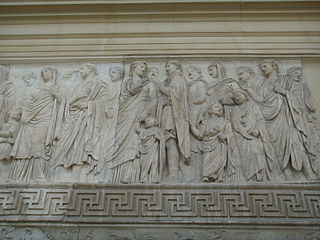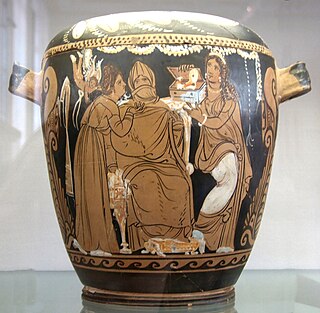Related Research Articles

A father is the male parent of a child. Besides the paternal bonds of a father to his children, the father may have a parental, legal, and social relationship with the child that carries with it certain rights and obligations. A biological father is the male genetic contributor to the creation of the infant, through sexual intercourse or sperm donation. A biological father may have legal obligations to a child not raised by him, such as an obligation of monetary support. An adoptive father is a man who has become the child's parent through the legal process of adoption. A putative father is a man whose biological relationship to a child is alleged but has not been established. A stepfather is a non-biological male parent married to a child's preexisting parent and may form a family unit but generally does not have the legal rights and responsibilities of a parent in relation to the child.
Primogeniture is the right, by law or custom, of the firstborn legitimate child to inherit the parent's entire or main estate in preference to shared inheritance among all or some children, any illegitimate child or any collateral relative. In most contexts, it means the inheritance of the firstborn son ; it can also mean by the firstborn daughter, or firstborn child.
Paternity law refers to body of law underlying legal relationship between a father and his biological or adopted children and deals with the rights and obligations of both the father and the child to each other as well as to others. A child's paternity may be relevant in relation to issues of legitimacy, inheritance and rights to a putative father's title or surname, as well as the biological father's rights to child custody in the case of separation or divorce and obligations for child support.
DNA paternity testing is the use of DNA profiles to determine whether an individual is the biological parent of another individual. Paternity testing can be especially important when the rights and duties of the father are in issue and a child's paternity is in doubt. Tests can also determine the likelihood of someone being a biological grandparent. Though genetic testing is the most reliable standard, older methods also exist, including ABO blood group typing, analysis of various other proteins and enzymes, or using human leukocyte antigen antigens. The current techniques for paternity testing are using polymerase chain reaction (PCR) and restriction fragment length polymorphism (RFLP). Paternity testing can now also be performed while the woman is still pregnant from a blood draw.

Adoption in ancient Rome was primarily a legal procedure for transferring paternal power (potestas) to ensure succession in the male line within Roman patriarchal society. The Latin word adoptio refers broadly to "adoption", which was of two kinds: the transferral of potestas over a free person from one head of household to another; and adrogatio, when the adoptee had been acting sui iuris as a legal adult but assumed the status of unemancipated son for purposes of inheritance. Adoptio was a longstanding part of Roman family law pertaining to paternal responsibilities such as perpetuating the value of the family estate and ancestral rites (sacra), which were concerns of the Roman property-owning classes and cultural elite. During the Principate, adoption became a way to ensure imperial succession.

A changeling, also historically referred to as an auf or oaf, is a human-like creature found throughout much of European folklore. According to folklore, a changeling was a substitute left by a supernatural being when kidnapping a human being. Sometimes the changeling was a 'stock', more often the changeling was a supernatural being made magically to look like the kidnapped human.
Legitimacy, in traditional Western common law, is the status of a child born to parents who are legally married to each other, and of a child conceived before the parents obtain a legal divorce. Conversely, illegitimacy, also known as bastardy, has been the status of a child born outside marriage, such a child being known as a bastard, a love child, a natural child, or illegitimate. In Scots law, the terms natural son and natural daughter carry the same implications.

Maurice Richard Povich is an American former television personality, best known for hosting the tabloid talk show Maury which aired from 1991 to 2022. Povich began his career as a radio reporter, initially at WWDC and later as host of a daytime Washington DC talk show Panorama. In the late 1980s, he gained national fame as the host of tabloid infotainment TV show A Current Affair, based at Fox's New York flagship station WNYW. In 1991 he co-produced his own show The Maury Povich Show, which in 1998 was rebranded as Maury.

The legal rights of women refers to the social and human rights of women. One of the first women's rights declarations was the Declaration of Sentiments. The dependent position of women in early law is proved by the evidence of most ancient systems.
Oikos was, in Ancient Greece, two related but distinct concepts: the family and the family's house. Its meaning shifted even within texts.
In the Hebrew Bible and Jewish religious law, a mamzer is a person who is born as the result of certain forbidden relationships or incest, or the descendant of such a person. Mamzer status is not synonymous with the traditional western definition of illegitimacy, since it does not include children born to unmarried mothers.
Polyandry is a marital arrangement in which a woman has several husbands. In Tibet, those husbands are often brothers; "fraternal polyandry". Concern over which children are fathered by which brother falls on the wife alone. She may or may not say who the father is because she does not wish to create conflict in the family or is unsure who the biological father is. Historically the social system compelled marriage within a social class.

Maury is an American first-run syndicated talk show that was hosted by Maury Povich. It ran for twenty-four seasons from September 9, 1991, to September 8, 2022, in which it broadcast 5,545 episodes. The show frequently featured paternity tests that determined if participants were father of a child or not.

Marriage in ancient Rome was a fundamental institution of society and was used by Romans primarily as a tool for interfamilial alliances. The institution of Roman marriage was a practice of marital monogamy: Roman citizens could have only one spouse at a time in marriage but were allowed to divorce and remarry. This form of prescriptively monogamous marriage that co-existed with male resource polygyny in Greco-Roman civilization may have arisen from the relative egalitarianism of democratic and republican city-states. Early Christianity embraced this ideal of monogamous marriage by adding its own teaching of sexual monogamy, and perpetrated it worldwide and became as an essential element in many later Western cultures.
The main family law of Japan is Part IV of Civil Code. The Family Register Act contains provisions relating to the family register and notifications to the public office.
Telegony is a largely discredited theory of heredity holding that offspring can inherit the characteristics of a previous mate of the female parent; thus the child of a woman might partake of traits of a previous sexual partner. Experiments in the late 19th century on several species failed to provide evidence that offspring would inherit any character from their mother's previous mates. It was superseded by the rediscovery of Mendelian inheritance and the Boveri–Sutton chromosome theory. The Encyclopædia Britannica says telegony "must now be classed as superstitions."

The jus trium liberorum, was a privilege awarded to Roman citizens who had produced at least three children or to freedpersons who had produced at least four. The privilege resulted from the Lex Papia Poppaea and other legislation on morality introduced by Augustus in the first centuries BC and AD. These laws were intended to increase the dwindling population of the Roman upper classes.
Paternity fraud is one form of misattributed paternity or paternal discrepancy. Specifically, paternity fraud is the intentional misidentification of a child's biological father. Paternity fraud is distinct from other, unintentional misattribution, which may arise from simple error, an accident such as a mix-up during fertility treatment, or a sexual assault.

The ancient Roman family was a complex social structure, based mainly on the nuclear family, but also included various combinations of other members, such as extended family members, household slaves, and freed slaves. Ancient Romans had different names to describe their concepts of family, such as, "familia" to describe the nuclear family and "domus" which would have included all the inhabitants of the household. The types of interactions between the different members of the family were dictated by the perceived social roles each member played. An ancient Roman family's structure was constantly changing as a result of the low life expectancy and through marriage, divorce, and adoption.

Marriage in ancient Greece had less of a basis in personal relationships and more in social responsibility, however the available historical records on the subject focus exclusively on Athens or Sparta and primarily on the aristocratic class. According to these records, the goal and focus of all marriages was intended to be reproduction, making marriage an issue of public interest. Marriages were usually arranged by the parents; on occasion professional matchmakers were used. Each city was politically independent and each had its own laws concerning marriage. For the marriage to be legal, the woman's father or guardian gave permission to a suitable man who could afford to marry. Daughters were usually married to uncles or cousins. Wintertime marriages were popular due to the significance of that time to Hera, the goddess of marriage. The couple participated in a ceremony which included rituals such as veil removal, but it was the couple living together that made the marriage legal. Marriage was understood to be the official transition from childhood into adulthood for women.
References
- ↑ Treggiari, Susan (1993). Roman Marriage: Iusti Coniuges from the Time of Cicero to the Time of Ulpian. New York: Oxford University Press. p. 238. ISBN 0-19-814939-5.
- ↑ Daniel Ogden, Greek bastardy in the classical and Hellenistic periods
- ↑ Gardner, Jane F. (1993). Being a Roman Citizen . New York: Rutledge. pp. 82-86. ISBN 0-415-00154-4.
- ↑ Rawson, Beryl (2005). Children and Childhood in Roman Italy . Oxford: Oxford University Press. pp. 99-100. ISBN 0-19-924034-5.
- ↑ Grubbs, Judith Evans (2002). Women and the Law in the Roman Empire: a Sourcebook on Marriage, Divorce, and Widowhood . London: Routledge. pp. 200-204. ISBN 0-415-15240-2.
- ↑ Wells, H.G. (1914). Social Forces in England and America. New York: Harper. p. 252. ISBN 978-1-77653-322-0.